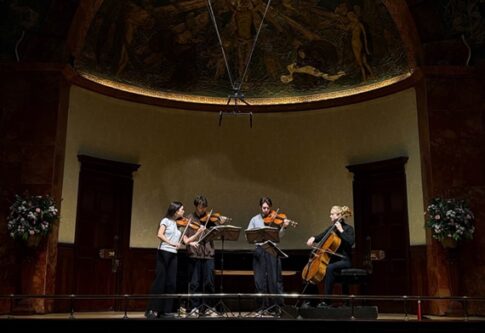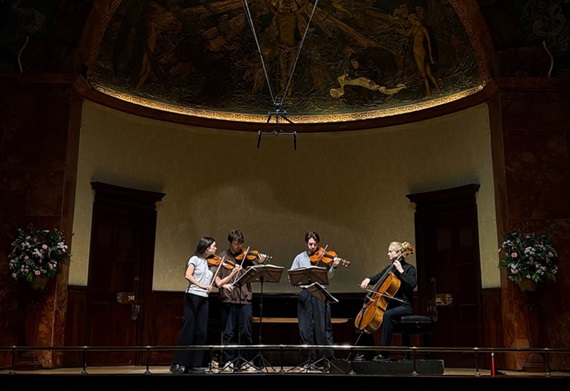 United Kingdom Beethoven: NOVO Quartet. Wigmore Hall, London, 19.1.2025. (CC)
United Kingdom Beethoven: NOVO Quartet. Wigmore Hall, London, 19.1.2025. (CC)

Beethoven – String Quartets: No.4 in C minor, Op.18/4 (1799/1800); No.9 in C major, Op.59/3, Razumovsky’ (1806)
The NOVO Quartet of Denmark won the 77th Concours de Genève; I was lucky enough to be present at the final. It was a fully deserved win, and the quartet is going from strength to strength. Certainly, the capacity audience for the mid-afternoon concert at Wigmore Hall was more than enthused.
And rightly so. Formed in Copenhagen 2018, the quartet comprises violinists Kaya Kato Møller and Nikolai Vasili Nedergaard, violist Daniel Śledziński and cellist Signe Ebstrup Bitsch, NOVO Quartet brings freshness to everything they play (from Haydn to Mette Nielsen) coupled with an interpretative depth way beyond their years. Hints of their way with Beethoven can be found in the semi-final of the Geneva competition, when they played the second ‘Razumovsky’ quartet of Beethoven (along with a piece by Donatoni, La Souris sans sourire, and Nielsen’s String Quartet No.1 in G minor, Op.13. That Beethoven Quartet burned with an internal fire and was mightily impressive; this concert showed the NOVO Quartet’s Beethoven has moved up a step or two from that already.
The supportive Wigmore acoustic brought out the warmth of their sound, while the NOVO members’ playing meant there was no blurring; they judged the acoustic well, too in terms of their (wide) dynamic range – here is a quartet unafraid of a true pianissimo.
Two nicely contrasted quartets formed the programme: The C minor Quartet from Op.18 (actually, the last of the set of six to be completed) and the C major ‘Razumovsky’. It was interesting to hear the exposition repeat of the first movement bringing a more urgent opening second time round. That complete dynamic range was complemented by a real sense of collective harmonic awareness, particularly around Beethoven’s darkening of territory. Nedergaard’s opening to the Andante scherzoso quasi allegretto was perfectly calibrated staccato, soon followed by equal expertise from his colleagues, the cello grounding the movement well. The Menuetto (marked Allegretto) verged on a scherzo (some performances retain the Menuetto feel – try the Talich Quartet, for example).
One interesting aspect of the NOVO Quartet’s performance was the occasional use of portamento. The Narratio Quartet has studied this in detail and is in the process of recording a complete cycle for Challenge Classics. The NOVO Quartet chose their moments carefully, always using the technique to enhance and never distract. The finale positively danced (with a decidedly Beethovenian gait!). The meeting of four equals really paid off here, every chord carefully voiced, each line responsive to its environment.
And so, to the so-called ‘middle period’ of Beethoven’s output with the third of the three ’Razumovsky’ Quartets. And a study in vibrato: the opening moved from non-vibrato to a far richer, vibrato-rich sound, a warming of timbre held within the most beautiful island of stillness. If ever there was an argument for dissolving the early-middle-late fences in Beethoven’s output it was here: the profundity was equal to anything in the Op.130s. And so, when the burst of joy came in the Allegro vivace (and these players are the very definition of ‘lively’), it was all the more radiant. Of especial note were the dialogues between Nedergaard and Śledziński here.
Beethoven’s capacity to at the very least raise eyebrows (even to shock) was there in the Andante con moto quasi allegretto, the opening cello pizzicato a stab to the heart from Signe Ebstrup Bitsch, while the viola’s gestures seemed in themselves like cries of pain (the viola comes into its own in this movement, and Śledziński was rock solid). While one can celebrate individual triumphs, it is worth noting how the quartet works so supremely well as a composite entity: the Menuetto had this writ large; rarely if ever have I heard a quartet diminuendo together at exactly the same rate, and yet here it was – and a joy to hear. The final aspect not considered is the NOVO Quartet’s virtuosity, but that was completely on show in the finale, an Allegro molto that was effectively a bustling Figaro Overture on serious amounts of amphetamines. Lovely to hear the viola as strong as the rest when Beethoven casually tosses fragments between instruments; a masterclass in quartet playing and, more to the point, Beethoven Quartet playing.
The NOVO Quartet is a stunning ensemble. This was an ECMA Showcase concert and part of the CAVATINA Chamber Music Trust ticket scheme (offering free tickets for those aged 8-25, information here).
As far as I can tell, this is the NOVO Quartet’s only UK date this year: much of their activity centres around Denmark and the surrounding countries, with trips to Germany and a return to Geneva, his time to the Conservatory of Music, not Victoria Hall, in February (a mouthwatering programme of Rued Langgaard, Beethoven Op.18/4 and Britten Second Quartet). Their schedule can be found here.
Colin Clarke
